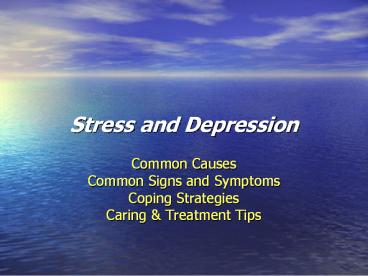Stress and Depression - PowerPoint PPT Presentation
1 / 22
Title:
Stress and Depression
Description:
Stress and Depression Common Causes Common Signs and Symptoms Coping Strategies Caring & Treatment Tips – PowerPoint PPT presentation
Number of Views:149
Avg rating:3.0/5.0
Title: Stress and Depression
1
Stress and Depression
- Common Causes
- Common Signs and Symptoms
- Coping Strategies
- Caring Treatment Tips
2
What Is Stress?
- Stress is the way your body relates to lifes
pressures.
3
What Are Some Common Sources of Stress?
- Situations in the home
- Parents separation or divorce,
- A new stepparent,
- A new brother or sister,
- A single parent household,
- Little or no emotional support,
- Neglect (personal needs not met),
- Abuse (physical or sexual)
4
What Are Some Common Sources of Stress?
- Situations in life
- Death of a loved one or friend,
- Moving to a new town or new school,
- Illness or hospitalization,
- Violence in the neighborhood, community, world,
- Natural disasters or other emergencies
5
What Are Some Common Sources of Stress?
- Situations at school
- Problems with friends,
- Gangs, threats from others, bullies,
- Competition,
- Popularity,
- Homework, grades, pressures to excel,
- No support for school work
6
Reactions to Stress
- Reactions to stress can be
- Short term
- Long term
- Extreme and life threatening
- Reactions to stress can affect a persons
- Physical health
- Emotional health
- Thinking
- Social activity
7
What Are Some Common Symptoms of Stress?
- Mental
- Difficulty communicating or listening,
- Lack of concentration,
- Memory problems,
- Difficulty making decisions,
- Disorientation and confusion,
- Loss of objectivity
8
What Are Some Common Symptoms of Stress?
- Feelings
- Frequent crying, show of emotions,
- Hyper-vigilance or excessive worry,
- Irritability, outbursts of anger, frequent
arguments, - Depression,
- Apathy,
- Denial,
- Anxiety or fear,
- Guilt,
- Grief
9
What Are Some Common Symptoms of Stress?
- Physical Changes
- Short-term physical reactions
- Oxygen
- Extra oxygen reaches the brain because the
bronchioles dilate - Endorphins
- Adrenaline
- Extra blood reaches the organs because the heart
rate increases
10
What Are Some Common Symptoms of Stress?
- Physical Symptoms
- Effects on the Body Long Term
- Damage to the cardiovascular, immune, and nervous
systems, - People develop patterns of response,
- These responses may indicate need for corrective
action to limit their impact.
11
What Are Some Common Symptoms of Stress?
- Change in behavior
- Increase or decrease in activity level,
- Substance use or abuse (alcohol or drugs),
- Decline in school performance, absenteeism,
- Avoidance of activities or places (isolation),
- Becoming accident prone,
- Inability to rest or relax,
- Blaming,
- Difficulty in giving or accepting support or
help, - Inability to experience pleasure or have fun
12
What Is Depression?
- Depression is a common and serious medical
condition characterized by extreme sadness and
loss of pleasure in life.
13
What Is Depression?
- Depression can lead to suicide.
- Depression can happen in anyones life.
- Any race
- Any social standing
- Any age 1 in 8 adolescents have some symptoms
14
What Causes Depression?
- Precise causes are not known.
- Biological - genetic factors
- Psycho - social factors
- Ex continued distress from any of the
previously identified stressors, - Ex distorted, negative thinking patterns
15
Contributing Factors for Depression in
adolescents
- Stressors such as fear of not meeting
expectations of parents, teachers, others - When things go wrong at school or at home teens
may feel unsure of abilities or question how they
fit in - Facing choices about friendship, sex, alcohol,
and drugs - Facing conflicting messages from parents,
teachers, friends and society
16
Danger Signs in Depressed adolescents
- When students
- Experience a humiliating or anxiety provoking
situation, - Show more than five major signs of depression for
over two weeks (see student handout Signs of
Depression), - Demonstrate or verbalize suicidal thoughts,
- Increase risk-taking behavior,
- Show signs of personality changes,
- Seriously neglect self-care
17
Stress and Depression
- Continued stress can lead to depression.
- Continued depression can lead to suicide.
- Managing stress can prevent or reduce depression
and suicide. - It is important to manage both stress and
depression.
18
Coping Strategies
- Coping with Stress
- There are many resources for stress management.
- Be aware of signs and symptoms of stress
- Take practical action to reduce the stress as
soon as possible. - Identify ways to manage / reduce source of
symptoms - Ex relaxation and meditation techniques to help
with physical symptoms of stress, - Ex discuss your thoughts and feelings with a
responsible adult
19
Coping Strategies
- Coping with Depression
- Recognize the signs of depression.
- Remember that depression is not a sign of
weakness nor is it something you can snap out
of. - Depression is a serious condition that needs
medical attention. - Depression can be successfully treated and the
emotional pain can be relieved.
20
Caring and Treatment Tips
- Stress
- Offer to listen,
- Suggest a responsible person / resource to go to
for help, - Depression
- Offer to listen - show concern,
- Trust your instincts - alert an adult to your
concern about a depressed person.
21
Extreme Stress
- Chronic or traumatic stress is potentially very
destructive and can deprive youth of physical
and mental health. - If stress is extreme and not managed, some
individuals may experience post traumatic stress
disorder (PTSD). - PTSD is a psychiatric disorder that can occur
following the experience or witnessing of
life-threatening events.
22
- file//localhost/Users/kevin.martins/Desktop/Healt
h Ed/Lesson15-20 AssessmentStressDepressionAssess
ment.docx - http//www.youtube.com/watch?vrfRB8yCEiLQlistPL
FDCABC6B2B1D9DB6index22































